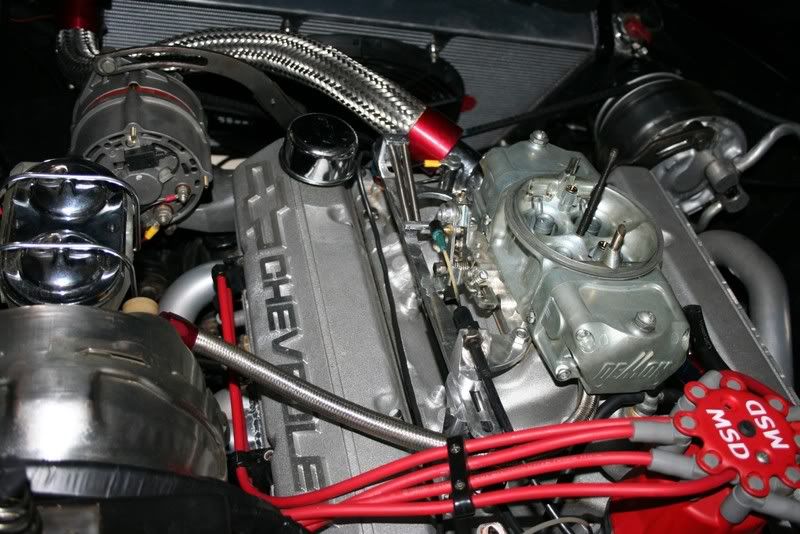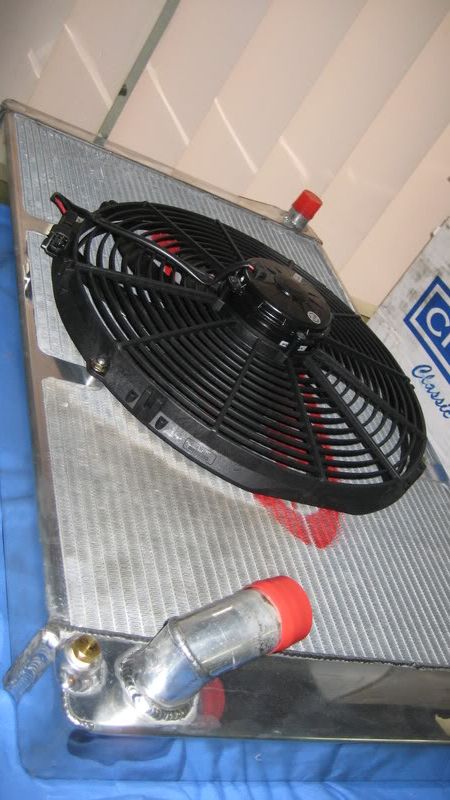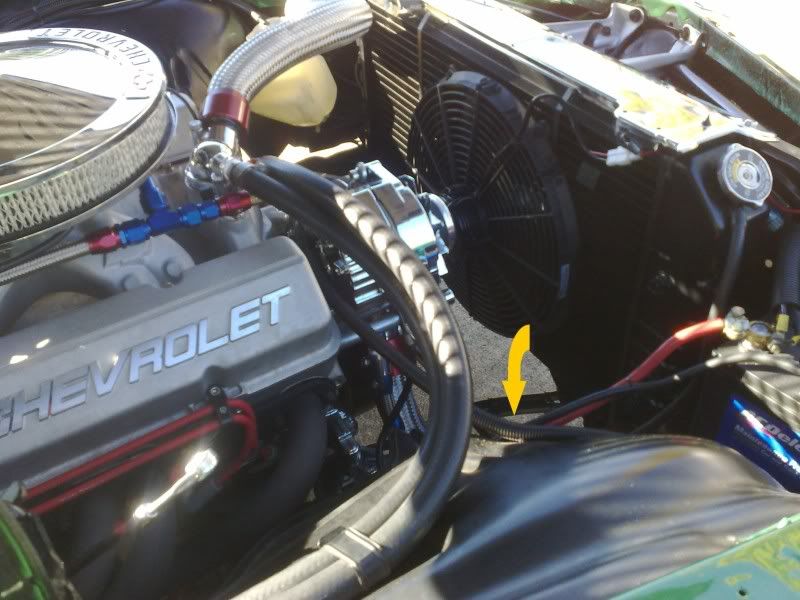Hiya all,
I'm just trying to work out why my radiator is leaking. I'm currently looking into possible electrolysis.
What voltages should I be looking at? The way I've set the multimeter is:
- probe neg to -ve terminal on battery & probe pos to radiator fluid with engine off. I've measured 0.135V and then a few minutes later 0.06V.
- With engine on and various accessories on I get anything from 0.02V - 0.12V. Fan & A/c gives about 0.02V, parker lights 0.12V, headlights 0.1V, high beams 0.06V.
- I've also tested probe neg to engine block and probe pos to radiator fluid with engine off/on with similar results.
In my interweb research I've read anything from 0.1V to 0.15V to 0.3V to 0.5V being the critical voltage value.
So does anyone know what the critical voltage value is? I have an alloy engine with an aluminium/plastic radiator.
Off on a tangent I measured the voltage across the battery and then the voltage between the engine block and +ve terminal on the battery and they are the same.
Cheers.
Notice: We request that you don't just set up a new account at this time if you are a previous user.
If you used to be one of our moderators, please feel free to reach out to Chris via the facebook Outerlimits4x4 group and he will get you set back up with access should he need you.
If you used to be one of our moderators, please feel free to reach out to Chris via the facebook Outerlimits4x4 group and he will get you set back up with access should he need you.
Recovery:If you cannot access your old email address and don't remember your password, please click here to log a change of email address so you can do a password reset.
Radiator electrolysis
Moderators: toaddog, TWISTY, V8Patrol, Moderators
Re: Radiator electrolysis
Hi.
The Holden Gen3/4 are alloy engines and use an alloy radiator with plastic sides.
You should use red coolant for this engines.
Maybe it is just Chevy that needs it or it is because the material of radiator and engine.
Never thought about a voltage difference in the coolant - maybe just earth your radiator?
Where is the voltage coming from? The coolant and the engine should have the same electric potential.
The Holden Gen3/4 are alloy engines and use an alloy radiator with plastic sides.
You should use red coolant for this engines.
Maybe it is just Chevy that needs it or it is because the material of radiator and engine.
Never thought about a voltage difference in the coolant - maybe just earth your radiator?
Where is the voltage coming from? The coolant and the engine should have the same electric potential.
Re: Radiator electrolysis
to answer your question mancap .05 is your maximim reading on your voltmeter. now you have to make sure you do not touch the probe on the neck of the radiator. it must be in the coolant only with engine running.It is possible sometimes to turn on accessories individually to see when it spikes and narrow down your search for the problem but generally i have found the biggest cause is the alternator. check your volt reading then run a ground wire from your alt to chassis and see if it drops.
it is normal for the volts to slightly rise when the thermo fans are turned on..they all do it . It is very important prior to testing you drain your coolant including block bungs to remove all the coolant . start fresh with tap water and test . if you dont coolant can actually hold a charge so the more you test the more important it is to refill with new water to avoid false readings.....NOW THE BIGGEST TIP...demineralised water only in a alloy radiator only with coolant on your final fill. tap water will kill a alloy radiator if left in there for any lengthy period of time .( testing is ok, just flush it with some demineralised before filling)
i will no longer buy alloy radiators full stop. i have had a pwr one before and other brands and eventually they all leak and can not easily be repaired and to be honest my copper/brass radiators in other cars all have the capacity to run at 160f if i choose that thermost so my question is ...Is the superior cooling of alloy really worth it??? get a leak in a copper/brass radiator and you can just braze it up and get on the road again.
now to combat electrolysis i would certainly run electrolysis arrestor , i would run a sacrificial anode either the type that replaces the drain bung or a piece of brass strip in a radiator hose. I would run at least 50 % glycol which is the red coolant and if you cooling system is up to it 75 % . if it was practical you could use 100 % glycol as electrolysis/current cannot travel through it. WWII aircraft ran 100 % glycol to combat the problem and while we are on the subject of WWII thats when " bars '' was invented for aircraft engines. I have used bars stop leak in an alloy radiator and not had a leak for 2 years since.


from now on i buy this ....................copper brass all the way

it is normal for the volts to slightly rise when the thermo fans are turned on..they all do it . It is very important prior to testing you drain your coolant including block bungs to remove all the coolant . start fresh with tap water and test . if you dont coolant can actually hold a charge so the more you test the more important it is to refill with new water to avoid false readings.....NOW THE BIGGEST TIP...demineralised water only in a alloy radiator only with coolant on your final fill. tap water will kill a alloy radiator if left in there for any lengthy period of time .( testing is ok, just flush it with some demineralised before filling)
i will no longer buy alloy radiators full stop. i have had a pwr one before and other brands and eventually they all leak and can not easily be repaired and to be honest my copper/brass radiators in other cars all have the capacity to run at 160f if i choose that thermost so my question is ...Is the superior cooling of alloy really worth it??? get a leak in a copper/brass radiator and you can just braze it up and get on the road again.
now to combat electrolysis i would certainly run electrolysis arrestor , i would run a sacrificial anode either the type that replaces the drain bung or a piece of brass strip in a radiator hose. I would run at least 50 % glycol which is the red coolant and if you cooling system is up to it 75 % . if it was practical you could use 100 % glycol as electrolysis/current cannot travel through it. WWII aircraft ran 100 % glycol to combat the problem and while we are on the subject of WWII thats when " bars '' was invented for aircraft engines. I have used bars stop leak in an alloy radiator and not had a leak for 2 years since.


from now on i buy this ....................copper brass all the way

Posts: 689
Joined: Sat Oct 09, 2010 5:12 pm
Joined: Sat Oct 09, 2010 5:12 pm
Location: SMUGGLING COOOOOKIES ACROSS THE MEXICAN BORDER
Re: Radiator electrolysis
i was driving my bosses V6 rodeo dual cab........same issue....top tank leaked.......
natrad in wollongong said it was the radio frequency that stuffs..........the plastic up..........
get a proper radiator.........plastic tanks are a pain......
natrad in wollongong said it was the radio frequency that stuffs..........the plastic up..........
get a proper radiator.........plastic tanks are a pain......
AUSTRALIA
WORTH LOOKING AT WORTH LOOKING AFTER
WORTH LOOKING AT WORTH LOOKING AFTER
Who is online
Users browsing this forum: No registered users and 5 guests